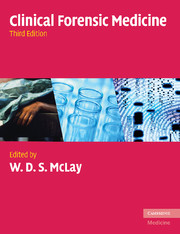Book contents
- Frontmatter
- Contents
- List of contributors
- Preface
- 1 Legal systems: a world view
- 2 Scottish legal system
- 3 The Police in the United Kingdom
- 4 The practitioner's obligations
- 5 The doctor in court
- 6 Custody medicine: physical conditions
- 7 Custody medicine: mental illness and psychological conditions
- 8 Substance misuse
- 9 Alcohol, drugs and driving
- 10 Injury
- 11 Child abuse: physical
- 12 Child abuse: sexual
- 13 Adult sexual offences
- 14 Management of at-risk exposures and infection control in custody
- 15 Scenes of crime
- 16 Forensic science
- 17 Forensic dentistry
- 18 Investigation of death
- 19 Dealing with a major disaster
- 20 Occupational health of police officers
- Index
- References
8 - Substance misuse
Published online by Cambridge University Press: 12 August 2009
- Frontmatter
- Contents
- List of contributors
- Preface
- 1 Legal systems: a world view
- 2 Scottish legal system
- 3 The Police in the United Kingdom
- 4 The practitioner's obligations
- 5 The doctor in court
- 6 Custody medicine: physical conditions
- 7 Custody medicine: mental illness and psychological conditions
- 8 Substance misuse
- 9 Alcohol, drugs and driving
- 10 Injury
- 11 Child abuse: physical
- 12 Child abuse: sexual
- 13 Adult sexual offences
- 14 Management of at-risk exposures and infection control in custody
- 15 Scenes of crime
- 16 Forensic science
- 17 Forensic dentistry
- 18 Investigation of death
- 19 Dealing with a major disaster
- 20 Occupational health of police officers
- Index
- References
Summary
Introduction
Substance misuse is a major and growing problem often resulting in drug-related criminal activity. Forensic physicians are seeing an increasing number of substance misusers in the setting of a police station [1]. These misusers may be intoxicated, withdrawing or dependent on alcohol or drugs. The police may request a medical assessment of substance misusing detainees in order to: assess their fitness for detention and fitness to be interviewed; conduct a mental state examination; undertake a comprehensive examination of their fitness to drive a motor vehicle; and perform an intimate search for drugs.
Some substance misusers will, for a variety of reasons, attempt to hide their misuse from the authorities on arrest. Therefore, it is most important that examining forensic physicians make a conscious effort to look for any indication of substance misuse or dependence. A sympathetic approach from the doctor is more likely to result in disclosure and a reliable history from the detainee, who should be reassured that effective treatment will be given where necessary and that the overriding consideration of the doctor is their clinical safety and wellbeing.
Criminality and drug use
The relationship between crime and drug use is very complex and takes a number of forms, with much of the crime committed reflecting the lifestyle and circumstances of the drug users themselves. Drug-related crime encompasses any criminal activity which is committed either to fund the purchase of drugs or as a consequence of drug misuse.
- Type
- Chapter
- Information
- Clinical Forensic Medicine , pp. 79 - 88Publisher: Cambridge University PressPrint publication year: 2009



